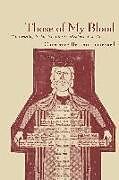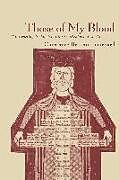Those of My Blood
Einband:
Fester Einband
EAN:
9780812235906
Untertitel:
Creating Noble Families in Medieval Francia
Genre:
Geschichte
Autor:
Constance Brittain Bouchard
Herausgeber:
University Of Pennsylvania Press
Anzahl Seiten:
264
Erscheinungsdatum:
20.03.2001
ISBN:
978-0-8122-3590-6
Informationen zum Autor Constance Brittain Bouchard Klappentext Those of My Blood Creating Noble Families in Medieval Francia Constance Brittain Bouchard Winner of the 2002 best book by an Ohio Historian Award of the Ohio Academy of History "Constance Bouchard tackles five major themes: the definition of 'family,' the position of women in noble families, the flexibility in constructing who was considered family, the impact of family strategies on early medieval politics, and the 'transformation' of the nobility around the year 1000. . . . A wonderful introduction to those new to the subject as well as a welcome contribution to the debate on the nature of the medieval nobility."--Medieval Review For those who ruled medieval society, the family was the crucial social unit, made up of those from whom property and authority were inherited and those to whom it passed. One's kin could be one's closest political and military allies or one's fiercest enemies. While the general term used to describe family members was consanguinei mei, "those of my blood," not all of those relations-parents, siblings, children, distant cousins, maternal relatives, paternal ancestors, and so on-counted as true family in any given time, place, or circumstance. In the early and high Middle Ages, the "family" was a very different group than it is in modern society, and the ways in which medieval men and women conceptualized and structured the family unit changed markedly over time. Focusing on the Frankish realm between the eighth and twelfth centuries, Constance Brittain Bouchard outlines the operative definitions of "family" in this period when there existed various and flexible ways by which individuals were or were not incorporated into the family group. Even in medieval patriarchal society, women of the aristocracy, who were considered outsiders by their husbands and their husbands' siblings and elders, were never completely marginalized and paradoxically represented the very essence of "family" to their male children. Bouchard also engages in the ongoing scholarly debate about the nobility around the year 1000, arguing that there was no clear point of transition from amorphous family units to agnatically structured kindred. Instead, she points out that great noble families always privileged the male line of descent, even if most did not establish father-son inheritance until the eleventh or twelfth century. Those of My Blood clarifies the complex meanings of medieval family structure and family consciousness and shows the many ways in which negotiations of power within the noble family can help explain early medieval politics. Constance Brittain Bouchard is Professor of Medieval History at the University of Akron. The Middle Ages Series 2001 | 264 pages | 6 x 9 ISBN 978-0-8122-3590-6 | Cloth | $65.00s | £42.50 World Rights | History Short copy: "A wonderful introduction to those new to the subject as well as a welcome contribution to the debate on the nature of the medieval nobility."--Medieval Review Zusammenfassung "A wonderful introduction to those new to the subject as well as a welcome contribution to the debate on the nature of the medieval nobility."-Medieval Review Inhaltsverzeichnis Preface Abbreviations 1. Introduction 2. The Origins of the French Nobility 3. Consanguinity and Noble Marriages 4. Family Structure and Family Consciousness in the Ninth Through Eleventh Centuries 5. The Bosonids, Rising to Power in the Late Carolingian Age 6. Patterns of Women's Names in Royal Lineages 7. The Migration of Women's N...
Autorentext
Constance Brittain Bouchard
Klappentext
Those of My Blood
Creating Noble Families in Medieval Francia
Constance Brittain Bouchard
Winner of the 2002 best book by an Ohio Historian Award of the Ohio Academy of History
"Constance Bouchard tackles five major themes: the definition of 'family,' the position of women in noble families, the flexibility in constructing who was considered family, the impact of family strategies on early medieval politics, and the 'transformation' of the nobility around the year 1000. . . . A wonderful introduction to those new to the subject as well as a welcome contribution to the debate on the nature of the medieval nobility."--Medieval Review
For those who ruled medieval society, the family was the crucial social unit, made up of those from whom property and authority were inherited and those to whom it passed. One's kin could be one's closest political and military allies or one's fiercest enemies. While the general term used to describe family members was consanguinei mei, "those of my blood," not all of those relations-parents, siblings, children, distant cousins, maternal relatives, paternal ancestors, and so on-counted as true family in any given time, place, or circumstance. In the early and high Middle Ages, the "family" was a very different group than it is in modern society, and the ways in which medieval men and women conceptualized and structured the family unit changed markedly over time.
Focusing on the Frankish realm between the eighth and twelfth centuries, Constance Brittain Bouchard outlines the operative definitions of "family" in this period when there existed various and flexible ways by which individuals were or were not incorporated into the family group. Even in medieval patriarchal society, women of the aristocracy, who were considered outsiders by their husbands and their husbands' siblings and elders, were never completely marginalized and paradoxically represented the very essence of "family" to their male children.
Bouchard also engages in the ongoing scholarly debate about the nobility around the year 1000, arguing that there was no clear point of transition from amorphous family units to agnatically structured kindred. Instead, she points out that great noble families always privileged the male line of descent, even if most did not establish father-son inheritance until the eleventh or twelfth century. Those of My Blood clarifies the complex meanings of medieval family structure and family consciousness and shows the many ways in which negotiations of power within the noble family can help explain early medieval politics.
Constance Brittain Bouchard is Professor of Medieval History at the University of Akron.
The Middle Ages Series
2001 | 264 pages | 6 x 9
ISBN 978-0-8122-3590-6 | Cloth | $65.00s | £42.50
World Rights | History
Short copy:
"A wonderful introduction to those new to the subject as well as a welcome contribution to the debate on the nature of the medieval nobility."--Medieval Review
Zusammenfassung
"A wonderful introduction to those new to the subject as well as a welcome contribution to the debate on the nature of the medieval nobility."-Medieval Review
Inhalt
Preface
Abbreviations
1. Introduction
2. The Origins of the French Nobility
3. Consanguinity and Noble Marriages
4. Family Structure and Family Consciousness in the Ninth Through Eleventh Centuries
5. The Bosonids, Rising to Power in the Late Carolingian Age
6. Patterns of Women's Names in Royal Lineages
7. The Migration of Women's Names in the Upper Nobility
8. Genealogy and Politics: The Counts of Autun and Countess Adelaide of Chalon
9. Twelfth-Century Family Structures
10. Conclusions: Family Structure and the Transformations of the Year
Appendix A: The Problem of the Three Bernards and the Dukes of Aquitaine
Appendix B: The Bosonids and the Family of Manasses
Notes
Bibliography
Index
Acknowledgments

Leider konnten wir für diesen Artikel keine Preise ermitteln ...
billigbuch.ch sucht jetzt für Sie die besten Angebote ...
Die aktuellen Verkaufspreise von 6 Onlineshops werden in Realtime abgefragt.
Sie können das gewünschte Produkt anschliessend direkt beim Anbieter Ihrer Wahl bestellen.
Loading...
Die aktuellen Verkaufspreise von 6 Onlineshops werden in Realtime abgefragt.
Sie können das gewünschte Produkt anschliessend direkt beim Anbieter Ihrer Wahl bestellen.
| # | Onlineshop | Preis CHF | Versand CHF | Total CHF | ||
|---|---|---|---|---|---|---|
| 1 | Seller | 0.00 | 0.00 | 0.00 |
